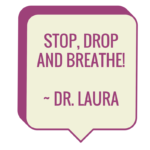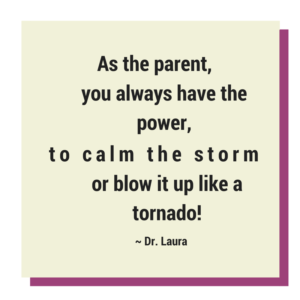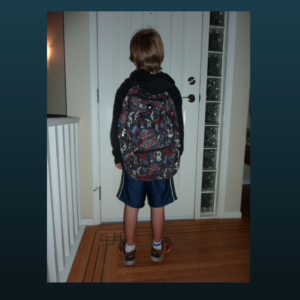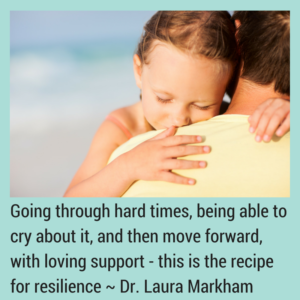On Friday night, I had the pleasure of attending Dr. Laura Markham’s two hour keynote presentation at the Children: The Heart of the Matter Conference in Vancouver, B.C. I always love seeing someone live for the first time, especially when I have been following them for many years and have read and loved their book (Peaceful Parent, Happy Kids: How to Stop Yelling and Start Connecting). I was also fortunate enough to be able to meet Dr. Laura at the end of the evening. She’s every bit as warm and authentic, as she comes across, in her blog and book. She covered a lot in the presentation; I’ve chosen her information on self-regulation, connection and coaching, to share with you today.
How to Handle Our Children’s Big Emotions?
- First and foremost, REGULATE ONE’S OWN EMOTIONS! “Stop, Drop and Breathe!” (What a great slogan!) The drop means drop everything you’re doing and just focus on breathing. If deep breathing by itself is too difficult, add motion (e-motion) – shake hands, move feet and say out loud “I’m so upset. I’m breathing to calm down. I’m shaking out my hands to calm down.” Remind oneself that this is not an emergency and this is not to be taken personally! (After all, your child’s brain has been hijacked by the Amygdala and is in “fight” mode. One cannot access the “wise leader” prefrontal cortex, in this state, and for young children the prefrontal cortex is only in the very early stages of development.)
- CONNECT – HUG! When someone’s crying say, “I’m sorry. I’m sorry it’s so hard.” Connection is what gives us influence. Dr. Laura believes that 80% of parenting is connection (and I wholeheartedly agree). Continue to acknowledge child’s feelings. If a child is too upset to have a hug, stay connected to him/her, until the tears come and then be ready for the hug. Accept the emotions.
- COACH rather than CONTROL! Resist the forced expectation of cooperation or this will create a power struggle, especially with strong-willed kids! The more you try to control a human, the more they resist. Emotion coach and use “win-win” problem solving. For example, ask “I wonder…?” questions.
Instead of isolating kids when they have big emotions, connect and coach ~ Dr. Laura
Why Is It So Important to Regulate Our Own Emotions?
- Models self-regulation
- Creates safety
- Allows child to express emotions instead of fighting
- Restores connection, thus child wants to cooperate
- Build’s child’s brain for self-regulation
Why Is Punishment So Negative?
- Punishment creates anger, thus misbehaviour increases
- Hardens hearts – Strong-willed kids can feel that it’s against their integrity
- Kids are less self-disciplined
- Creates a harsh inner-voice
- Makes kids less moral and better liars
- Gives kids the message that they’re all alone to manage emotions
- Encourages “stuffing-down” of emotions, but then the misbehaviour bubbles back up to the surface another time
What to Do Instead of Punishment?
REPAIR! (This connects to my previous post: Repair, Reconnect, Revive) Empower your child to REPAIR and make amends. Ask “I wonder what you can do to make things better?” “What might you do next time?”
What is the Emotional Backpack?
Dr. Laura explains that if you let yourself feel emotion, it moves through you, but if you hold onto it and stuff it down into the “emotional backpack”, it keeps bubbling up to be healed. Once we let ourselves feel emotion, it dissipates. Children would rather pick a fight with you than feel their emotions. Anger is the body’s “fight” response to feeling under threat. It takes vulnerability to feel the feelings below the anger such as fear, sadness, disappointment etc. To heal, one needs to go under the anger to feel the more vulnerable emotions.
In the words of Dr. Laura: Crying heals. We all need a witness. Crying reduces anxiety and builds resilience. It’s okay to cry and it’s important that parents support through the tears. Crying is the beginning of resilience.
Dr. Laura Markham shared so much valuable information and reassured all the parents and educators in the audience, who may be more familiar with more traditional behaviourist approaches, that parenting a child with connection and coaching, creates children who learn to manage their emotions, apologize, take responsibility, make amends and demonstrate self-discipline. Next week, I’ll continue with Dr. Laura’s thoughts on “Preventive Maintenance” for oneself, as well as the parent-child relationship. I am very grateful to Dr. Laura for travelling to Vancouver, all the way from New York, to share her words of wisdom.
I wish you a wonderful week connecting and coaching with your children,
Warmly,
My 6 Top Apps for Creating More Calm for You and Your Children!
Want to Connect?
Subscribe now to receive free weekly parenting tips and inspiration.











